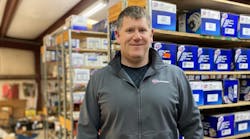Jeff Cowan is the founder of Jeff Cowan's Pro Talk, a sales training and consulting firm based in Rancho Santa Margarita, Calif. Cowan presented a session called "How You Have Your Best Year in Service" at the recent NADA Convention in February. He spoke to Aftermarket Business World about some of the factors that impact service sales.
You noted in your presentation that dealership service departments should be having a good year, because people are holding onto their vehicles longer. But some dealers are still struggling on the service side. Why is that?
What I believe happened is that on the first day the recession started in 2008, they were told by their customers that they didn't have any money and so they just needed the bare minimum service performed on their vehicles.
When I go to dealer 20 group meetings, most of these dealers are not having good service years because their advisors are still in that recession mindset. They have to find ways to close people on the idea of letting them make a presentation. If I can't make a presentation, then I can't ask you to buy anything.
What sorts of best practices are successful dealers putting in place?
First, they have to have a contract that clearly states what the advisor's job is, how it is to be done and the processes that are supposed to be followed to do it right. You put in minimum standards in terms of sales, effective labor rates, satisfaction stores, etc. If you hire a new sales person and he only sells three cars a month, you let him go. The same should hold on the service drive.
Still, many customers do have a lot of concerns about spending too much money.
You don't twist arms. You frankly point out to the customer what is gong on with their vehicle and why it is important to have that service done. You have a very different customer walking through the door now than you did prior to the recession. They are prioritizing how they want their money spent.
But something you can't cut back on is the maintenance of your vehicle, because your vehicle is what you'll need most in times like these. If you can't get to work, everything else is irrelevant.
What are some ways dealers are getting customers in the door?
One example: if you buy any service from the dealership, you get free roadside assistance. That's a great idea because if you come in and get a $25 oil change, a month from now maybe your car won't start. I give you free assistance. I will tow a car that doesn't run into my shop. Dealers are getting an extra 100 or 200 vehicles a quarter doing things like that.
Loyalty programs are big right now. You can build points and use those points on future repairs and services.
This is a huge opportunity for the car industry to step up and point out to customers that the service department is a viable place to come and get your car repaired. Ford and GM are doing really well right now with national advertisements about this.
The old saying is that the sales department sells the first car and service department sells the second one. Everybody gets it now. The dealers and manufacturers understand that fixed operations has been an overlooked department. They've been stepping over $100 bills to pick up pennies, and the $100 bills are right in the fixed ops department.
Jeff Cowan is the founder of Jeff Cowan's Pro Talk, a sales training and consulting firm based in Rancho Santa Margarita, Calif. Cowan presented a session called "How You Have Your Best Year in Service" at the recent NADA Convention in February. He spoke to Aftermarket Business World about some of the factors that impact service sales.
You noted in your presentation that dealership service departments should be having a good year, because people are holding onto their vehicles longer. But some dealers are still struggling on the service side. Why is that?
What I believe happened is that on the first day the recession started in 2008, they were told by their customers that they didn't have any money and so they just needed the bare minimum service performed on their vehicles.
When I go to dealer 20 group meetings, most of these dealers are not having good service years because their advisors are still in that recession mindset. They have to find ways to close people on the idea of letting them make a presentation. If I can't make a presentation, then I can't ask you to buy anything.
What sorts of best practices are successful dealers putting in place?
First, they have to have a contract that clearly states what the advisor's job is, how it is to be done and the processes that are supposed to be followed to do it right. You put in minimum standards in terms of sales, effective labor rates, satisfaction stores, etc. If you hire a new sales person and he only sells three cars a month, you let him go. The same should hold on the service drive.
Still, many customers do have a lot of concerns about spending too much money.
You don't twist arms. You frankly point out to the customer what is gong on with their vehicle and why it is important to have that service done. You have a very different customer walking through the door now than you did prior to the recession. They are prioritizing how they want their money spent.
But something you can't cut back on is the maintenance of your vehicle, because your vehicle is what you'll need most in times like these. If you can't get to work, everything else is irrelevant.
What are some ways dealers are getting customers in the door?
One example: if you buy any service from the dealership, you get free roadside assistance. That's a great idea because if you come in and get a $25 oil change, a month from now maybe your car won't start. I give you free assistance. I will tow a car that doesn't run into my shop. Dealers are getting an extra 100 or 200 vehicles a quarter doing things like that.
Loyalty programs are big right now. You can build points and use those points on future repairs and services.
This is a huge opportunity for the car industry to step up and point out to customers that the service department is a viable place to come and get your car repaired. Ford and GM are doing really well right now with national advertisements about this.
The old saying is that the sales department sells the first car and service department sells the second one. Everybody gets it now. The dealers and manufacturers understand that fixed operations has been an overlooked department. They've been stepping over $100 bills to pick up pennies, and the $100 bills are right in the fixed ops department.


